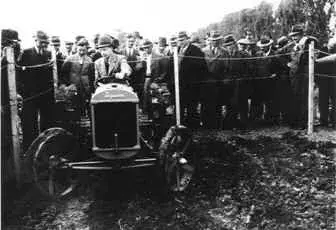The Atlantic Alliance
In 1972, David Brown Tractors was acquired by US conglomerate Tenneco Inc., linking it with the renowned J.I. Case Company. The two brands began integrating production and marketing operations.
In 1973, a unified colour scheme, orchid white, power red, and black, was adopted. Joint David Brown/Case dealerships were soon established in the UK and abroad, and Case construction machines began using David Brown-built engines and transmissions.
Recognition and Achievements
David Brown became Britain’s third-largest tractor manufacturer, receiving the Royal Warrant and several Queen’s Awards to Industry for exports and technological achievement. In 1976, the company's Hydra-Shift semi-automatic transmission won a Design Council Award, the first given for a farm tractor.




In The Beginning...
David Brown’s journey into agricultural machinery began in 1936, when the company, then part of David Brown and Sons (Huddersfield) Ltd, partnered with Harry Ferguson to produce the pioneering Ferguson-Brown tractor.
Built initially in a corner of the David Brown gear factory, it was the first production tractor with hydraulic lift and converging 3-point linkage, a breakthrough in tractor design that set a new global standard.
Roughly 1,350 units were produced, with the final batch built at Meltham, before Ferguson and Brown parted ways. Ferguson headed to the US to work with Henry Ford, while David Brown began developing his own tractors.
The first model, the VAK1, debuted at the 1939 Royal Show and was well received. However, with the onset of World War II, full production was delayed as Meltham shifted to making gears for the war effort. Still, tractor development continued through limited production of aircraft towing vehicles, ensuring a smooth return to peacetime tractor manufacturing in 1946.
Despite entering a competitive market late, David Brown tractors quickly earned a reputation for quality and innovation.
Our History
Expansion and Innovation
In 1955, the company acquired Harrison, McGregor and Guest Ltd. of Leigh, Lancashire, famed for its Albion-brand machinery. Both Leigh and Meltham underwent major modernisation. A highlight came in 1971 with the completion of a state-of-the-art tractor assembly complex at Meltham, one of the most advanced in Europe.
Leigh became the key supplier of large tractor components and developed a range of tractor-mounted implements, including front loaders and ditchers.
